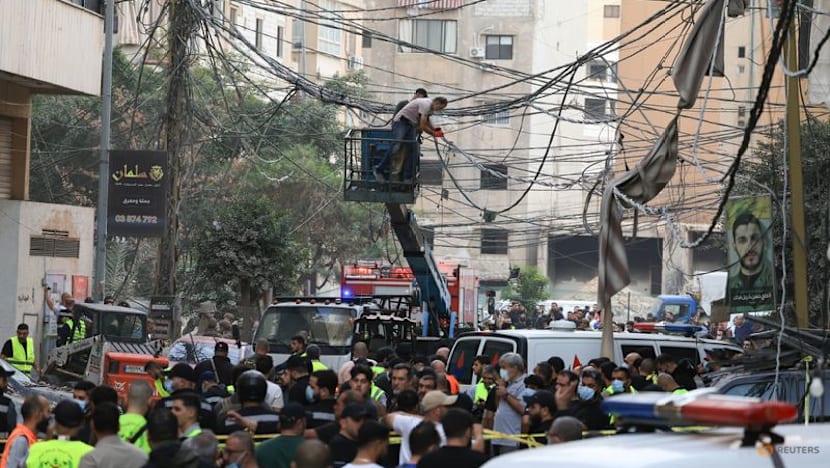Tabatabai: Hezbollah military chief who led the group in Yemen, Syria
Tabatabai is the most senior Hezbollah official following the November 2024 ceasefire. Israel continues to strike Lebanon, claiming to be targeting Hezbollah

Civil defence members work as people gather near the site of an Israeli strike, after Israeli military said it struck a militant from the Lebanese Iran-aligned Hezbollah group, in Beirut's southern suburbs, Lebanon on Nov 23, 2025. (Photo: Reuters/Mohamed Azakir)
BEIRUT: Haytham Ali Tabatabai, Hezbollah's top military chief whom Israel killed on Sunday (Nov 23), had taken the role after the group's senior leaders died in the most recent war with Israel.
He is the most important Hezbollah figure to have been killed since a November 2024 ceasefire sought to end over a year of hostilities between the militant group and Israel, including two months of full-blown war.
Largely unknown to the Lebanese public, Tabatabai was among the new commanders chosen to lead the group after the war.
Israel has repeatedly bombed Lebanon since the truce, mostly claiming to be targeting Hezbollah members and infrastructure.
Hezbollah confirmed the killing of "the great commander" Tabatabai.
Prior to his role as military chief, Tabatabai was "responsible for the Yemen file" in the group, a source close to the group told AFP.
The United States says he had also operated in Syria, where the group's armed faction supported former ruler Bashar al-Assad.
The strike hit an apartment building in Beirut's densely populated southern suburbs, where the group holds sway, killing five people and wounding 28 according to Lebanon's health ministry.
The source said Tabatabai was based abroad and returned to Lebanon after Israel killed top Hezbollah military commander Fuad Shukr in July.
Tabatabai's father is of Iranian origin and his mother Lebanese, according to the source, who said Tabatabai held Lebanese citizenship.
The US State Department designated him as a "terrorist" and sanctioned him in 2016.
The US Treasury offered a US$5 million reward for information on him, adding that he was also known as Abu Ali Tabatabai.
The US Treasury described Tabatabai as a key Hezbollah military leader "who has commanded the group's special forces in both Syria and Yemen".
The Israeli army said Tabatabai was a Hezbollah veteran who joined the group in the 1980s and held a series of senior positions, including "serving as the head of Hezbollah's operations in Syria".
Yemen's Houthi rebels and Hezbollah are part of Iran's so-called "axis of resistance" against Israel.
In November 2024, the United Nations named Hezbollah as one of the Houthis' "most important supporters", adding that Houthi fighters were being trained outside Yemen, either in Iran or at Hezbollah training facilities in Lebanon.
In addition to Hezbollah leader Hassan Nasrallah and Shukr, Israel has killed many of the movement's main military figures.
Those include Ibrahim Aqil, who led the elite Radwan unit, and Ali Karake, who was the number three military commander.













